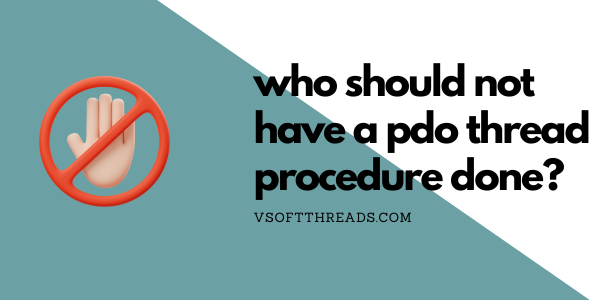
PDO threads have entered the equation as a viable and excellent alternative to surgical facelifts. No longer do you have to undergo invasive surgery to get that youthful look back in your face.
PDO threads procedures are minimally-invasive, require only general numbing agents, don’t take a lot of time to complete, have limited recovery time and cost significantly less than traditional surgical facelifts.
The synthetic polymer that is used in these procedures is completely biocompatible and biodegradable, meaning there is low risk for adverse reactions. The body will naturally break down the PDO threads over time, which is why they’ve been used as dissolvable sutures for more than 50 years now.
That being said, not everyone is a candidate for PDO threads. Below, we discuss who should not have a PDO thread procedure done.
While PDO threads are a great alternative to traditional surgical facelifts, there are some people who are just not a good fit for them. Women who are pregnant or breastfeeding, and those who suffer from autoimmune diseases or diabetes generally should not get a PDO threads procedure based on the potential complications.
Table of Contents
Add a header to begin generating the table of contents
 Medically reviewed by: Elizabeth Williams RN
Medically reviewed by: Elizabeth Williams RN
Updated: 10/6/2024
A woman’s body undergoes immense changes while she’s pregnant, especially in regard to the hormones it produces. To support the baby, the body procedures extra estrogen and progesterone.
These elevated hormone levels cause some women’s skin to be different than it was before they became pregnant. This can include extra oiliness or a change in skin texture.
And while pregnant women may be tempted to get an aesthetic medicine procedure such as one using PDO threads to address these skin changes, it’s generally not a good idea.
There hasn’t been a lot of research done on the effects of PDO threads on a pregnant woman’s body, and it’s always best to err on the side of caution. In addition, pregnant women may experience extra swelling and/or bruising after a PDO threads procedure, which can make an uncomfortable situation even more so.
The same goes for women who are breastfeeding. That’s why it’s best to wait until after your baby is born and is no longer breastfeeding to get a PDO threads procedure.
Learn more about PDO Threads and Pregnancy
People who have an autoimmune disease are also advised not to get a PDO threads procedure. That’s because their disease can interfere with the natural process that the body uses to break down the threads once they are inserted.
A person’s body tends to be more sensitive to foreign objects if they have an autoimmune disease, even those like PDO threads that are made from completely biocompatible materials. This means the material may never be broken down properly, which could significantly affect healing as well as the results of the procedure.
This could lead to some complications such as extra swelling and/or bruising, or even something more serious. That’s why it’s always best to consult with a medical provider first if you have an autoimmune disease to understand some of the potential complications.
Learn more about autoimmune disease and PDO Threads
PDO threads are great for addressing sagging skin and to rejuvenate your face to make you look younger again. However, they won’t be able to properly address some concerns.
For instance, people who have excess skin in their face or extreme sagging might not be the best fit for a PDO threads procedure. It’s not that there will be any complications, but rather that the procedure may not produce the desired results.
That’s because PDO threads procedures only lift skin that’s in your face. This is different from a traditional surgical facelift, which also can reposition underlying muscle, tissue and fat — or even trim away some of the loose skin that might be in the area.
People who are older are usually more susceptible to these types of conditions, which is why they may not be a good fit for PDO threads. As always, though, it’s a good idea to consult with a medical provider first so they can help you determine whether a PDO threads procedure would be right for you.
While PDO threads are a great alternative to traditional surgical facelifts, there are some people who are just not a good fit for them. Women who are pregnant or breastfeeding, and those who suffer from autoimmune diseases or diabetes generally should not get a PDO threads procedure based on the potential complications.
In addition, people who are experiencing extreme sagging and/or have excess skin in the face might not be able to achieve the results they desire with PDO threads alone.
Of course, it isn’t an across-the-board rule that if you’re older or have a certain skin type that you shouldn’t get a PDO threads procedure done. Instead, it’s best to consult with a medical provider you trust to tell you whether you’d be a good fit or not, based on the results of a general exam.
When you’re searching for a medical provider, make sure that they also use PDO threads produced by V Soft Lift.
We have produced multiple types of PDO threads so medical providers can choose specific ones that cater to your skin type and the results you wish to achieve.
For more information, please contact us today.
Please be aware that you are about to access the international website for V Soft Lift PDO Threads. It’s essential to note that this site has not undergone evaluation by the USA FDA.
The information provided on this platform may discuss regulatory clearances in countries outside the United States. Consequently, it might include indications and uses that extend beyond the FDA-cleared labeling for the product.
It’s important to emphasize that the details presented on this website are not intended to diagnose, treat, cure, or prevent any disease. This information should not be seen as a replacement for advice from a qualified physician or healthcare professional.
I Agree :
I Disagree :